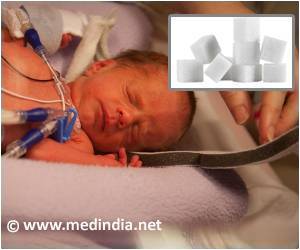Receiving deeper or longer duration cooling did not reduce risk of neonatal intensive care unit death among full-term newborns with moderate or severe hypoxic ischemic encephalopathy.

364 full-term infants were randomly assigned to four hypothermia groups- 33.5 degree C for 72 hours, 32.0 degree C for 72 hours, 33.5 degree C for 120 hours, and 32.0 degree C for 120 hours, to examine if longer duration and deeper cooling would improve outcomes at 18 to 22 months.
The authors concluded, “Among neonates of at least 36 weeks' gestational age with moderate or severe hypoxic ischemic encephalopathy, deeper cooling or longer duration of cooling compared with hypothermia at 33.5 degree C for 72 hours did not reduce NICU death. These results have implications for patient care and the design of future trials."
The study is published in the ‘JAMA’.
Source-Medindia









